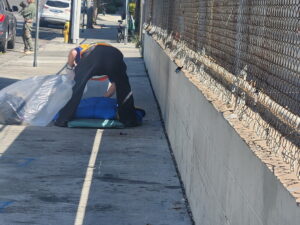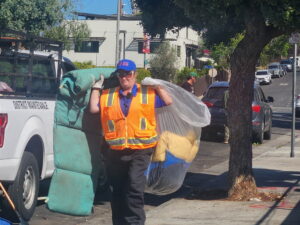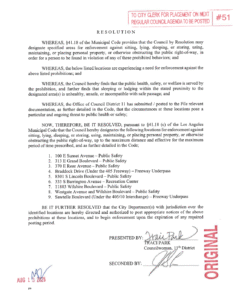Two LAMC 41.18 “anti-camping” zones in Venice appear to have been enacted without meeting the law’s requirements, while a third enforcement perimeter at the now-closed Venice Bridge Home remains in place through backdoor methods. Together, the moves raise questions about whether Councilmember Traci Park is pushing the city’s anti-camping laws beyond their legal limits to satisfy political pressure from certain constituents.
On June 5, 2024, the Los Angeles City Council approved Park’s motion creating a 41.18(c)(3) zone around 720 Rose Avenue, home to the Rose Apartments. Under city law, these zones can only be designated within 500 feet of “designated facilities” such as shelters, interim housing, or drop-in centers that serve unhoused people. The Rose Apartments is none of those. It is permanent supportive housing, where tenants are no longer considered homeless and are not counted in the annual homeless census. While Venice Community Housing operates administrative offices at the property, they are not public service locations. Calling this a “designated facility” is a stretch designed to meet the ordinance’s language while targeting an area where nearby residents had long complained about encampments.
Housing researchers say the designation is not only legally flawed but also based on a false premise. Studies from the NYU Furman Center show permanent supportive housing does not lower property values and can even improve neighborhood conditions, undermining arguments that such zones are necessary to protect economic interests or safety.
On December 12, 2023, City Council rubber stamped another 41.18 zone that was introduced by Park as covering the “Journey Apartments” at 2467 Lincoln Boulevard. The name itself is misleading. The enforcement area is centered on the Safe Place for Youth drop-in center located at the same address. Journey Apartments is a permanent supportive housing complex for formerly homeless residents, and invoking it in the motion feeds public fear of permanent housing as a magnet for crime or disorder. Even more concerning, Park introduced this motion on November 14, 2023, more than a year before the first residents moved into Journey Apartments and SPY opened its drop-in center. At the time of designation, the site did not meet the ordinance’s definition of a “designated facility.”
SPY’s drop-in center offers food, clothing, hygiene products, health care, counseling, and housing referrals to unhoused youth five days a week. Advocates argue that using 41.18 to push people away from the area directly undermines the ordinance’s stated goal of ensuring unhoused people can access essential services. They also note that Park lives just a short walk from the site.
The most visible example of prolonged enforcement beyond what the law allows can be found at the former Venice Bridge Home. The site, once the largest source of transitional housing on the Westside, closed earlier this year. Its closure should have triggered the removal of its Special Enforcement Zone, a perimeter that allowed LAPD to clear encampments in the surrounding area. By city policy, enforcement is no longer permitted when a Bridge Home site closes. But the signage remains posted, and Park’s office appears to be sustaining enforcement through a combination of aggressive city CARE+ sweeps and the Venice Business Improvement District’s Clean Team, operated by the nonprofit Chrysalis.
 Residents say CARE+ crews were sweeping the area twice a week for a period, targeting the few people still living nearby. On July 9, 2025, BID Clean Team workers were photographed throwing away unhoused residents’ belongings. According to a bystander, the worker explained that “the Mayor cleaned it up with Inside Safe and they don’t want people coming back.” Advocates say these sweeps and BID activity create a de facto Special Enforcement Zone, despite the legal end of such enforcement.
Residents say CARE+ crews were sweeping the area twice a week for a period, targeting the few people still living nearby. On July 9, 2025, BID Clean Team workers were photographed throwing away unhoused residents’ belongings. According to a bystander, the worker explained that “the Mayor cleaned it up with Inside Safe and they don’t want people coming back.” Advocates say these sweeps and BID activity create a de facto Special Enforcement Zone, despite the legal end of such enforcement.
The role of Chrysalis’ Clean Team also highlights the use of Business Improvement Districts as quasi-public enforcement arms. Funded by commercial property owners, BIDs like Venice’s operate alongside police and sanitation to remove encampments. Chrysalis markets its Clean Team as a job training program for unhoused people, but much of the work involves confiscating and discarding belongings during sweeps. Critics call this “service-washing” that disguises displacement as outreach, while in reality undermining stability and survival for those on the street.
 The history of the Bridge Home site also undercuts the narrative that encampments emerged because of the shelter. People were living there long before the facility opened, and continuing to police the area after its closure amounts to punishing people for returning to a place where they had community and relative stability.
The history of the Bridge Home site also undercuts the narrative that encampments emerged because of the shelter. People were living there long before the facility opened, and continuing to police the area after its closure amounts to punishing people for returning to a place where they had community and relative stability.
A Human Rights Watch report on Los Angeles homelessness enforcement found that laws like 41.18 have become a primary tool for displacement, often applied without offering shelter or housing options. Such enforcement disrupts people’s connections to outreach workers, destroys personal property, and can set them back months in their efforts to find housing. Moreover, RAND’s recent Venice findings reinforce that the reduction in visible homelessness in the neighborhood has been driven not by new housing or outreach, but by enforcement. Their analysis showed the entire decline in unsheltered homelessness over the past year came from a drop in people living in vehicles, a change driven by parking restrictions and enforcement.
The Rose Apartments, the misnamed Journey Apartments zone targeting SPY’s drop-in center, and the lingering Bridge Home enforcement show a clear pattern of pushing anti-homeless enforcement beyond what the law allows. Instead of addressing homelessness through housing and services, Park is pursuing more bans, more policing, and more displacement, even when the measures are illegal and proven to cause harm.
 That expansion is ongoing. As this article is being written, Park has introduced yet another motion to expand 41.18 enforcement in Council District 11. The August 13, 2025 resolution would add nine more locations, including freeway underpasses and high-traffic public spaces, to the list of areas where sitting, lying, sleeping, or storing belongings is banned. It is the latest step in a growing pattern of escalating enforcement instead of addressing homelessness with housing and services.
That expansion is ongoing. As this article is being written, Park has introduced yet another motion to expand 41.18 enforcement in Council District 11. The August 13, 2025 resolution would add nine more locations, including freeway underpasses and high-traffic public spaces, to the list of areas where sitting, lying, sleeping, or storing belongings is banned. It is the latest step in a growing pattern of escalating enforcement instead of addressing homelessness with housing and services.

